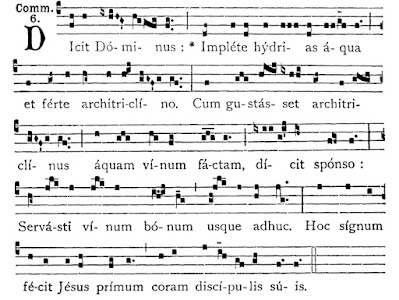Latin is the one of the keys to opening up the great treasure house of the Church’s musical patrimony. Here is the Communio of today’s Mass in utroque usu, taken from the Gospel of the Wedding of Cana, John 2, 1-11, which recounts Christ’s first public miracle. This event has been celebrated as part of the Epiphany since at least the 5th century.
“Dicit Dóminus: Implete hýdrias aqua et ferte architriclíno. Cum gustásset architriclínus aquam vinum factam, dicit sponso: Servásti bonum vinum usque adhuc. Hoc signum fecit Jesus primum coram discípulis suis.”
Note the two Greek words, “hydria - a water vessel” and “architriclinus - the steward (or) master of the banquet.” As St. John XXIII wrote, “The Church...values especially the Greek and Latin languages in which wisdom itself is cloaked, as it were, in a vesture of gold. She has likewise welcomed the use of other venerable languages, which flourished in the East. For these too have had no little influence on the progress of humanity and civilization. By their use in sacred liturgies and in versions of Holy Scripture, they have remained in force in certain regions even to the present day, bearing constant witness to the living voice of antiquity.”
Veterum Sapientia Institute can help you learn more about foundations of the Church’s prayer life.












